June 1960
| << | June 1960 | >> | ||||
|---|---|---|---|---|---|---|
| Su | Mo | Tu | We | Th | Fr | Sa |
| 1 | 2 | 3 | 4 | |||
| 5 | 6 | 7 | 8 | 9 | 10 | 11 |
| 12 | 13 | 14 | 15 | 16 | 17 | 18 |
| 19 | 20 | 21 | 22 | 23 | 24 | 25 |
| 26 | 27 | 28 | 29 | 30 | ||
The following events occurred in June 1960:
.svg.png)
June 20, 1960: Mali Federation independent
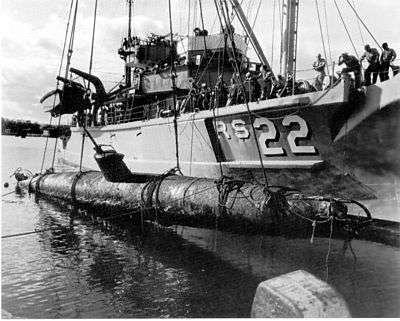
June 13, 1960: Japanese 2-man sub I-18 raised from Pearl Harbor after 18 years
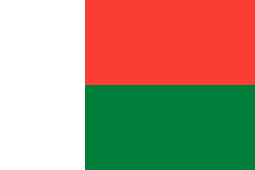
June 26, 1960: Malagasy Republic independent
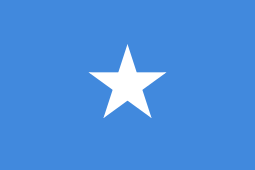
June 26, 1960: Somali Republic independent
.svg.png)
June 30, 1960: Congo (Leopoldville) independent from Belgium
June 1, 1960 (Wednesday)
- Television was introduced to New Zealand, as broadcasts started in Auckland on AKTV, Channel 2, at 7:30 pm and continued until 10:00 pm. The first program was an episode of The Adventures of Robin Hood.[1]
- In Laredo, Texas, Charles Manson was arrested on charges of violating the Mann Act and his parole terms. He would remain in prison until 1967, and go on to infamy as leader of a cult of serial killers.[2]
- In St. Louis, Chuck Berry was acquitted by a jury of charges of violating the Mann Act.[3]
- Trans-Canada Air Lines began transatlantic jet service, with a Douglas DC-8 aircraft flying a route from Montreal to London
- Texas began the "Little School" program, pioneered by Felix Tijerina, in 614 schools statewide. The program, designed to teach Spanish-speaking preschoolers 400 essential English words for a head start in the first grade, enrolled 15,805 children at its start.[4]
- In a record that still stands, a 114-pound roosterfish was caught by fisherman Abe Sackheim at La Paz, Baja California Sur.[5]
- Died: Lester Patrick, 78, who, as first coach of the NHL's New York Rangers, popularized ice hockey in the United States.
June 2, 1960 (Thursday)
- At a concert at the civic hall in Neston, Cheshire, John Lennon, Paul McCartney, George Harrison, Stu Sutcliffe and Tommy Moore performed for the first time under the name The Beatles.[6]
- For the first time since 1919, New York's 22 Broadway theaters were closed, and scheduled performances were cancelled. The "theater blackout" was occasioned by a dispute between the Actors Equity Association and the League of New York Theaters, but was resolved after eleven days.[7]
- Born:
- Kyle Petty, NASCAR driver, in Randleman, North Carolina
- Tony Hadley, English singer (Spandau Ballet), in Islington, London;
June 3, 1960 (Friday)
- Argentina demanded that Israel return Adolf Eichmann, and then asked for reparations for Eichmann's seizure by Mossad agents in Buenos Aires. On August 2, the dispute was resolved by Israel keeping Eichmann, but acknowledging that Argentina's fundamental rights had been infringed upon.[7]
- Canadian Prime Minister John Diefenbaker arrived in Washington, D.C. for a state visit and private talks with United States President Dwight D. Eisenhower.[8]
- Born: Don Brown, American novelist and attorney, in Plymouth, North Carolina
June 4, 1960 (Saturday)
- The Aerospace Corporation, a non-profit company, was incorporated in California.[9]
- Articles 85 and 86 of the Constitution of France were amended to permit former territories to attain complete independence and to remain as members of the French Community. The decision did not save the Community, which had only six members—Gabon, Congo, Chad, the CAR, the Malagasy Republic and France—left by 1962.[10]
- Born: Bradley Walsh, English comedian and actor, in Watford.
- Died: Józef Haller, 87, Polish military leader, in London.
June 5, 1960 (Sunday)
- Voters in a referendum in Cambodia approved making Prince Norodom Sihanouk as a non-royal Chief of State. The "official" result of the non-secret vote was 99.98% in favor of Sihanouk.[11]
- Dwight D. Eisenhower became the first incumbent President of the United States to deliver the commencement speech at the University of Notre Dame. Jimmy Carter (1977), Ronald Reagan (1981), George H.W. Bush (1992), George W. Bush (2001) and Barack Obama (2009) were later speakers.[12]
June 6, 1960 (Monday)
- Barbra Streisand, an 18-year-old Brooklynite, began a professional singing career by winning $50 in a talent contest at "The Lion", a nightclub in Greenwich Village.[13]
- The first fixed-rate heart pacemaker, with five year mercuric-oxide battery and designed by a team headed by William Chardack, was implanted in a patient.[14]
- The American Heart Association announced a "statistical association" between heavy cigarette smoking and coronary heart disease, with heavy smokers having 50 to 150 percent greater death rate from heart disease than non-smokers.[15]
- The 1954 Convention Relating to the Status of Stateless Persons went into effect, protecting the rights of any "person who is not considered as a national by any State under the operation of its law".[16]
- Lightweight boxer Tommy Pacheco was fatally injured in a bout with Benny Gordon at St. Nicholas Arena in New York. Pacheco died three days later from a cerebral hemorrhage.[17]
- At the Dutch Grand Prix in Zandvoort, won by Jack Brabham, a spectator was killed. Dan Gurney's car skidded off the track, fatally injuring 18-year old Piet Aalders of Haarlem.[18]
- Three teenagers were brutally murdered in Finland while on a camping trip. The fourth member of the group, who had been seriously wounded, would be arrested nearly 44 years later,[19] but would be acquitted.[20]
- Born: Steve Vai, American guitarist, in Carle Place, New York
- Died: Ernest L. Blumenschein, 86, American painter
June 7, 1960 (Tuesday)
- A BOMARC missile, and its nuclear warhead, caught fire at McGuire Air Force Base in New Jersey. Although a liquid helium tank in the missile exploded, and the warhead was melted by the fire, there was no risk of a nuclear blast in the Philadelphia area. The accident did cause a spillage of plutonium, and the contaminated areas were subsequently encased under asphalt and concrete.[21]
- Ronald Reagan resigned as President of the Screen Actors Guild.[22]
June 8, 1960 (Wednesday)
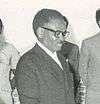
Dr. Neto
- Dr. Agostinho Neto, leader of the MPLA in Portuguese West Africa (now Angola), was arrested by colonial authorities at his clinic at Catete, and charged with subversion by colonial authorities. Dr. Neto would later be released, and, in 1975, would become the first President of Angola.[23]
- In the Saskatchewan election, Tommy Douglas's Co-operative Commonwealth Federation won a fifth consecutive majority. The election was significant as the first in which the province's Indians had voted.[24]
- Born: Mick Hucknall, English rock singer and songwriter (Simply Red), in Denton
June 9, 1960 (Thursday)
- Typhoon Mary made landfall near Hong Kong and then moved across to the Fukien Province of China, killing more than 1,600 people.[25]
- The new American Football League signed a five-year television contract with the ABC television network for $8.5 million.[26]
- Died: Tsutomu Sato, pioneering Japanese ophthalmologist who developed refractive surgery for vision improvement.
June 10, 1960 (Friday)
- Trans Australia Airlines Flight 538 crashed into the ocean off of Mackay, Queensland, while making its approach from Brisbane, killing all 29 people.[27] The crash of the Fokker F-27 remains the worst loss of life in a civilian air crash in Australia; a 1943 crash of a B-17 bomber killed 40 people.
- Earlier in the day, all 31 persons aboard Aeroflot Flight 207 were killed in the Soviet Union on an Ilyushin 14P that had departed Rostov in the Russian SFSR with four scheduled stops and a final destination of Tbilisi in the Georgian SSR. After takeoff from Sochi (in Russia) on a short flight to Kutaisi (in Georgia) and impacted at Mount Rech in the Caucasus Mountains.[28]
- In Tokyo, President Eisenhower's Press Secretary, James C. Hagerty, appointments secretary Thomas E. Stephens, and U.S. Ambassador to Japan Douglas MacArthur II had their car surrounded by an angry mob, and were trapped inside for an hour and a half before a U.S. Marine helicopter rescued them. Eisenhower set off on his tour of the Far East the next day and refused to postpone his trip to Japan.[29]
- June 10, 1960, had been the scheduled date for President Eisenhower to arrive in Moscow to begin a tour of the Soviet Union, but the plans were cancelled in May 1960 following the U-2 Incident.
June 11, 1960 (Saturday)
- An opera based on A Midsummer Night's Dream, created by Benjamin Britten and Peter Pears from the play by William Shakespeare, had its first performance.[30]
- Thirty people at a wedding reception in Multan, Pakistan, were killed in the collapse of a roof.[7][31]
June 12, 1960 (Sunday)
- Elections began in Lebanon, and for the first time, the secret ballot was made available to voters, a reform implemented after the 1957 elections were tainted with fraud.[32] Voting for the 99 member parliament, which reserved 55 seats for Christians and 44 for Moslems, was conducted over four Sundays. Saeb Salam, leader of the Phalangists (Kataeb Party), became Prime Minister in August.
- Born: Corynne Charby, French model, actress and singer, in Paris
June 13, 1960 (Monday)
- A Japanese midget submarine that had been sunk by depth charges near Pearl Harbor on December 7, 1941, was discovered after more than 18 years. The two-man I-18 was raised by the USS Current on July 6 and then returned to Japan.[33]
June 14, 1960 (Tuesday)
- Pacific Northern Airlines Flight 201 flew into the side of Mount Gilbert (Alaska), killing all 14 people on board.[34]
- Died: Ana Pauker, 67, former Romanian Minister of Foreign Affairs (1947 to 1952) and the first woman to serve as a foreign minister of any nation
June 15, 1960 (Wednesday)
- The eight-month-long strike by the Writers Guild of America ended with a settlement that the writers would later regret, with the right to residuals on old films being given up in return for health and pension benefits.[35]
- Thousands of protesters in Japan, angry over Japan's ratification of the security treaty with the United States, stormed into the parliament building and clashed with police. One female student, Michiko Kamba, was killed, and more than 600 students were injured. Nationwide, and estimated 5.8 million people participated in demonstrations.[36] U.S. President Eisenhower cancelled a planned (June 19) visit to Tokyo at the request of Japan's Prime Minister Nobusuke Kishi.[7]
- BC Ferries, the second largest ferry operator in the world, started service with two ships, the M.V. Tsawwassen and the M.V. Sidney, operating between Tsawwassen and Swartz Bay.[37]
- A heat burst occurred near the resort of Lake Whitney, Texas, shortly after midnight, followed by a windstorm. Despite later claims that, from 80 degrees, "the temperature rose to nearly 140 °F",[38] contemporary accounts at the time reported a peak of 95°.[39]
June 16, 1960 (Thursday)
- Portuguese colonial troops killed more than 600 Mozambican people as they fired into a crowd of black Africans who were protesting for the independence of Portuguese East Africa. In 1975, Portugal would finally allow the nation to become independent as Mozambique.[40]
- The proposed 23rd Amendment to the United States Constitution was approved by the U.S. Senate, two days after it had passed the House, and submitted to the states for ratification. Sponsored by Congressman Emanuel Cellar of New York, the amendment granted the District of Columbia three electoral votes, allowing D.C. residents to vote in presidential elections, and was ratified by March 29, 1961.[41]
- Psycho, directed by Alfred Hitchcock and starring Anthony Perkins as the killer at the Bates Motel, had its premiere, at two cinemas in New York City, the DeMille and the Baronet.[42]
- Born: Peter Sterling ("Sterlo"), Australian rugby league star, in Toowoomba, Queensland
June 17, 1960 (Friday)
- Ted Williams of the Boston Red Sox hit his 500th home run, in a game at Cleveland, off of Indians' pitcher Wynn Hawkins. Williams was only the fourth person to reach the milestone, after Babe Ruth, Jimmie Foxx and Mel Ott. Twenty-three others have hit 500 homers as of 2015.[43]
- El Rancho Vegas, which in 1941 became the first casino resort on what would become the Las Vegas Strip, burned down.[44]
- Communists won the elections to the leadership of the Iraqi Cigarette Workers Union. However, the government authorities refused to acknowledge the result, and called for new elections.[45]
- The new American Football League filed an antitrust lawsuit against the National Football League.[46] Following trial, a court concluded that the NFL had not violated the law.
- Born: Thomas Haden Church, American actor, in Woodland, California
June 18, 1960 (Saturday)
- The Middleton Railway, at Leeds in England, became the first standard gauge line to be operated by volunteers.[47]
- "Freedomland", a theme park designed in the shape of the United States and billed (until a lawsuit) as "Disneyland of the East", was dedicated in the Bronx, and opened the next day.[48]
- The first commencement of the University of Waterloo was held.[49]
June 19, 1960 (Sunday)
- In Moscow, KGB Chairman Aleksandr Shelepin secretly delivered a report to Soviet Premier Nikita Khrushchev, warning that, according to KGB sources in the U.S., "the chiefs at the Pentagon are hoping to launch a preventive war against the Soviet Union". Relying on the misinformed report, Khrushchev publicly stated ten days later that the Soviets would use their own missiles if the U.S. attempted to invade Cuba.[50]
- Peñarol, the champion of Uruguay's soccer football league, won the first Copa de Campeones of South America, playing a 1 to 1 draw against Paraguayan champion Club Olimpia in Asunción, a week after a 1 to 0 win over Olimpia in Montevideo. With the award of the cup (now referred to as the Copa Libertadores based upon the aggregate score, Peñarol had an overall 2 to 1 win in the competition among the 1959 champions of ten South American nations.
- The Charlotte Motor Speedway opened in Concord, North Carolina, and hosted the first World 600 NASCAR race. Joe Lee Johnson won the first running of the 600.[51]
- On his tour of the Far East, U.S. President Eisenhower encountered his first hostile reception, while visiting the island of Okinawa. A crowd of 1,500 protesters demonstrated in favor of the island's return from U.S. administration to Japan.[7]
- Died:
- Jimmy Bryan, 34, winner of the 1958 Indianapolis 500, was killed when he lost control of his car during a race at the Langhorne Speedway in Pennsylvania.[52]
- Chris Bristow, 22, English race car driver who viewed was a "future world champion",[53] was killed on the 20th lap of the Belgian Grand Prix when he crashed and was thrown from his car.
- Alan Stacey, 26, English race car driver, was killed on the 26th lap of the Belgian Grand Prix when he was struck in the face by a flying bird while driving at 120 miles per hour, causing him to lose control and overturn in a fiery crash.[54] Only six of the 17 starters were able to finish the race, won by Jack Brabham.[55]
June 20, 1960 (Monday)
- At New York's Polo Grounds, a crowd of 31,892 watched Floyd Patterson became the first person to regain the world heavyweight boxing championship. In the fifth round, Patterson knocked out champion Ingemar Johansson with a powerful left hook that left the Swedish boxer unconscious for ten minutes. Johansson then walked out under his own power.[56]
- The Mali Federation, created in 1959 by a merger of the French Sudan and Senegal, was granted independence by France. Modibo Keïta was head of the Federation, and Léopold Sédar Senghor was Speaker of the National Assembly.[57] The Federation existed for two months, until Senegal (led by Senghor), seceded on August 20. The former French Sudan then became the Republic of Mali, with Keita as its President.
- Nan Winton became the first national female newsreader on BBC television.
- Died:
- John B. Kelly Sr., 70, athlete turned self-made millionaire, and father of Monaco's Princess Grace
- William E. Fairbairn, 75, English soldier and hand-to-hand combat expert.
June 21, 1960 (Tuesday)
- Armin Hary of West Germany became the first man to run 100 meters in 10.0 seconds. He was competing in an event in Zurich, Switzerland.[58]
- A major oil discovery was made in the Tyumen Oblast of the Soviet Union, "heralding the beginning of western Siberian production on a large scale". Starting in 1964, petroleum from the Shaim Oil Field would be shipped on the Irtysh River to a refinery in Omsk.[59]
- Southeastern Illinois College was established in Harrisburg, Illinois, following a referendum.[60]
- The TV Western Colt .45 broadcast its final episode, after three seasons on ABC.
- The last operational B-29 bomber flew its final mission, a routine radar evaluation flight.
June 22, 1960 (Wednesday)
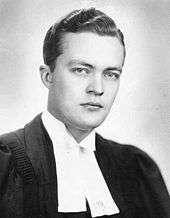
Lesage
- In the Quebec general election, the ruling Union Nationale, led by Antonio Barrette, was defeated by the Quebec Liberal Party, led by Jean Lesage, beginning the "Quiet Revolution" in the historically conservative Canadian province.[61]
- All fifty-four persons on board a Brazilian REAL airliner were killed when the Convair CV-340 crashed into Guanabara Bay while approaching Rio de Janeiro.[7][62]
- The first launch of two satellites from the same rocket took place at Cape Canaveral, as the United States placed a Transit II-A and a solar radiation satellite into space. Thirty minutes later, a spring-loaded device sent the two spheres into separate orbits.[7]
- A fire in a department store in Liverpool killed eleven people.[7]
- Born: Adam Schiff, U.S. Congressman for California since 2001; in Framingham, Massachusetts
June 23, 1960 (Thursday)
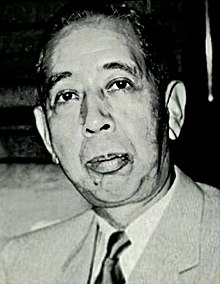
Kishi
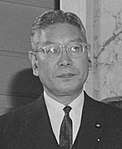
Ikeda
- On the day that the unpopular U.S.-Japan Security Treaty went into effect, Japan's Prime Minister Nobusuke Kishi announced his resignation. Kishi was replaced by Ikeda Hayato.[63]
- Rival Congolese leaders Joseph Kasavubu and Patrice Lumumba agreed to share power, with Kasavubu to become the former Belgian colony's first President, and Lumumba to become the nation's first Prime Minister.[64]
- Enovid, the first FDA approved contraceptive drug, became available in pill form at pharmacies throughout the United States.[65]
June 24, 1960 (Friday)
- Romulo Betancourt, the President of Venezuela, was injured in an assassination attempt that was later traced back to Dominican Republic dictator Rafael Trujillo. As the presidential limousine drove through Caracas on Avenida de los Proceres, a bomb concealed inside a parked 1954 Oldsmobile was detonated. A bystander, and Betancourt's aide, Ramon Armas Perez, were fatally injured.[66]
- The Romance of Helen Trent, which had been a daytime soap opera on the CBS Radio Network since its debut on October 30, 1933, was broadcast for the 7,222nd and last time, ending a run of almost 27 years.[67]
- All 54 people on board a Brazilian airliner, operated by REAL Transportes Aéreos were killed when the Convair CV-340 plane plunged into the sea while making its approach to Rio de Janeiro after a flight from Belo Horizonte.[68]
- Born:
- Adel Abdel Bary, Egyptian al-Qaeda officer and plotter in the 1998 bombing of the United States Embassys in Kenya and Tanzania
- Juli Inkster, American golfer and winner of seven championship tournaments, in Santa Cruz, California
June 25, 1960 (Saturday)
- The first talks between the government of France and the leadership of the Algerian rebel group, the FLN, took place in the Parisian suburb of Melun.[69]
- William H. Martin and Bernon F. Mitchell, two cryptologists with the National Security Agency, departed the United States for a vacation in Mexico, then flew the next day to Cuba and defected to the Soviet Union.[70]
- Died: Sudhindranath Dutta, 59, Bengali Indian poet
June 26, 1960 (Sunday)
- The State of Somaliland, led by Prime Minister Muhammad Haji Ibrahim Egal, attained independence from the United Kingdom. On Friday, the former British Somaliland protectorate united with the UN Trust Territory in the former Somalia Italiana, to create the Somali Republic.[71]
- The Malagasy Republic, located on the island of Madagascar, attained full independence from France, with Philibert Tsiranana as President.[72]
- The Havana Sugar Kings played their last baseball game in Cuba, defeating the visiting Rochester Red Wings, 6-5, in the predominantly American International League. After the IL's All-Star break, the Havana team played at Buffalo and Richmond, and then transferred to Jersey City, New Jersey, before their game in Miami.[73]
June 27, 1960 (Monday)
- Chlorophyll "A" was first synthesized, at Harvard University by Robert Burns Woodward.[74] Woodward would be awarded the Nobel Prize in Chemistry in 1965.
- Disarmament discussions in Paris came to an end when the Soviet Union and its allies withdrew from further talks. Talking resumed in March 1962.[75]
- Typhoon Olive struck the Philippines, killing 104 people and leaving more than 500 missing.[7]
- Best Seller premiered on the CBS Radio Network. It was the last daytime radio soap opera, and was cancelled, along with all others, on November 25.[76]
- Jamaican and British soldiers and policemen arrested 100 members of the First Africa Corps, a Rastafarian group, ending its influence in Jamaica.[77]
- Died:
- Lottie Dod, 88, English tennis player; Wimbledon women's champion, 1887–1888 and 1891–1893
- Harry Pollitt, 70, General Secretary, 1929–1956, of Communist Party of Great Britain
- Ivan Matetić Ronjgov, 80, Croatian composer
June 28, 1960 (Tuesday)
- Forty-five coal miners were killed in an explosion at Six Bells Colliery, Monmouthshire, Wales.[7]
- The University of Novi Sad was founded in Yugoslavia.
- Lightning strikes started 143 separate fires across Arizona and New Mexico, the most recorded in a single day.[78]
- Born: John Elway, American NFL quarterback for the Denver Broncos, in Port Angeles, Washington
June 29, 1960 (Wednesday)
- Cuba nationalized the Texaco oil refinery in Santiago de Cuba, after the corporation refused to process Soviet petroleum. The seizure of Esso of Cuba and Shell Oil refineries followed two days later.[7][79]
- The first weather satellite, TIROS, was shut down by NASA after 78 days, 1,302 orbits, and almost 23,000 weather photos.[80]
- The BBC Television Centre was opened in London.[81]
June 30, 1960 (Thursday)
- At 12:01 a.m. (0101 GMT), the Belgian Congo was proclaimed independent by Belgium's King Baudouin. The new Congolese Prime Minister, Patrice Lumumba, then delivered an angry speech about colonial rule.[82] Two days later, the first rioting began, followed by an army mutiny and civil war.[83]
- Lionel Bart's musical, Oliver!, based on the 1838 Charles Dickens novel Oliver Twist, was presented for the first time. The debut on London's West End was joined by a Broadway production on January 6, 1963.[84]
- Born: Lunna (Maria Socorro Garcia de la Noceda), Puerto Rican singer, in Ponce.
gollark: What if you... use some Rust code to run bits of the compilation in parallel for whatever bizarre reason?
gollark: And... have that interact with the x86 assembly?
gollark: I thought you didn't like ©++.
gollark: That is entirely accursed.
gollark: Not all.
References
- New Zealand TV database
- Sanders, Ed (2002). The Family. Thunder's Mouth Press. p. 9.
- Pegg, Bruce (2005). Brown Eyed Handsome Man: The Life and Hard Times of Chuck Berry. Routledge. p. 146.
- Guadalupe San Miguel, Brown, Not White: School Integration and the Chicano Movement in Houston (Texas A&M University Press, 2005), p55
- Ristori, Al (2008). The Complete Book of Surf Fishing. Skyhorse Publishing. p. 24.
- Walter Everett, The Beatles as Musicians: The Quarry Men through Rubber soul (Oxford University Press, 2001), p46
- "Chronology June 1960", The World Almanac and book of facts, 1961 (New York World-Telegram, 1960), pp172–175
- Gulick, Lewis (June 3, 1960). "Diefenbaker, Ike Confer On Cold War; Canadian Premier Makes Brief Visit". Eugene Register-Guard. Eugene, Oregon. AP. p. 2A. Retrieved May 12, 2015.
- Davis Dyer, TRW: Pioneering Technology and Innovation Since 1900 (Harvard Business School Press, 1998), p231
- Victor T. Le Vine, Politics in Francophone Africa (Lynne Rienner 2004), p72
- Milton Osborne, Sihanouk: Prince of Light, Prince of Darkness (University of Hawaii Press, 1994) p119
- "Notre Dame Commencement Speakers"
- Allison J. Waldman, The Barbra Streisand Scrapbook (Citadel Press, 2001), p25
- Harris B. Shumacker, The Evolution of Cardiac Surgery (Indiana University Press, 1992), p186
- "Smoking is Linked to Heart Disease", New York Times, June 7, 1960, p36
- Edward Lawson, Encyclopedia of Human Rights (Taylor & Francis, 1996), pp1401–1402
- "Pacheco Dies of Fight Injuries", New York Times, June 10, 1960, p27
- "Brabham Scores in Grand Prix", The Age (Melbourne, Australia), June 8, 1960, p23
- "Man remanded on suspicion of infamous unsolved triple murder from 1960" Archived 2008-12-10 at the Wayback Machine, Helsingen Sanomat, April 5, 2004
- "Court finds Gustafsson not guilty of 1960 Bodom Lake triple murder", Sanomat, October 7, 2005
- "A-Tipped Bomarc In Fire", Milwaukee Sentinel, June 8, 1960, p1; Mark A. Berhow, US Strategic and Defensive Missile Systems 1945-90 (Osprey, 2005), pp28-29
- "Reagan Quits Post", New York Times, June 8, 1960, p46
- M.S. Gill, Trials That Changed History: From Socrates to Saddam Hussein (Sarup & Sons, 2007), pp218–219; "Looking and Listening ...", The Crisis, (June–July 1962), pp335–336
- F. Laurie Barron, Walking in Indian Moccasins: The Native Policies of Tommy Douglas and the CCF (University of British Columbia Press, 1997), p135
- "Typhoon Mary Hits Red China", Charleston (WV) Gazette, June 10, 1960, p1; "Chinese Coast Typhoon Toll Set At 1,600", Charleston Daily Mail, June 20, 1960, p2
- Christopher Price, The Blueprint: How the New England Patriots Beat the System to Create the Last Great NFL Superpower (Thomas Dunne Books, 2007), p26
- Aviation Safety Network
- Aviation Safety Network
- "Ike Won't Call Off Trip After Hagerty Mobbing", Oakland Tribune, June 10, 1960, p1
- John W. Freeman, The Metropolitan Opera: Stories of the Great Operas, Vol. 2 (W.W. Norton, 1984), p57
- "30 Killed at Party", The Independent (Long Beach, CA), June 13, 1960, p2
- "Lebanon: The First Secret Ballot", TIME Magazine, June 27, 1960; "Ex-president Is Winner in Lebanon", Spokane Spokesman-Review, June 13, 1960, p1
- HIJMS Submarine I-18: Tabular Record of Movement, by Bob Hackett and Sander Kingsepp
- airdisaster.com
- Kathleen Sharp, Mr. & Mrs. Hollywood: Edie and Lew Wasserman and Their Entertainment Empire (Carroll & Graf Publishers, 2003), p86
- Miki Y. Ishikida, Toward Peace: War Responsibility, Postwar Compensation, and Peace Movements and Education in Japan (iUniverse, 2005), p91
- BC Ferries website
- Patricia Barnes-Svarney and Thomas E. Svarney, Skies of Fury: Weather Weirdness Around the World, pp111-112 (Simon & Schuster, 1999)
- "Midnight Heat Wave, Winds Hit Resort Area", Corpus Christi Times, June 15, 1960, p1
- "Mueda massacre", in Gwyneth Williams and Brian Hackland, The Dictionary of Contemporary Politics of Southern Africa (Routledge, 1988), p164
- John R. Vile, Encyclopedia of Constitutional Amendments, Proposed Amendments, and Amending Issues: 1789–2002 (ABC-CLIO 2003), pp480–481
- Robert E. Kapsis, Hitchcock: The Making of a Reputation (University of Chicago Press, 1992) p59; "Hitchcock's 'Psycho' Bows at 2 Houses", New York Times, June 17, 1960, p37
- "Fenway '500' club a history maker", by Michael Silverrman, SouthCoastToday.com, June 18, 2009
- "Las Vegas Insider" (December 2006), p4
- Middle East Record 1960. London: published for the Israel Oriental Society, the Reuven Shiloah Research Center. pp. 252-253
- "USFL v. NFL: The Challenge Beyond the Courtroom", by Boris Kogan
- Bushell, J. (1975). The World's Oldest Railway: a history of the Middleton Railway. Sheffield: Turntable Publications. ISBN 0-902844-27-X.
- Robert McLaughlin, Pleasure Island (Arcadia Publishing, 2009), p80
- University of Waterloo, "Daily Bulletin", June 16, 1999
- Christopher M. Andrew and Vasili Mitrokhin, The World Was Going Our Way: The KGB and the Battle for the Third World (Basic Books, 2005), p38
- Ed Hinton, Daytona: From the Birth of Speed to the Death of the Man in Black (Warner Books, 2001) p114
- "Winner of '500' Dies", Ottawa Citizen, June 20, 1960, p1
- "To Reduce Engine Power", Ottawa Citizen, June 20, 1960, p1
- "Top 5 Unusual Ways to Die Through the Ages"
- "Two British Drivers Die", Spokane Spokesman-Review, June 20, 1960, p8;
- Alan H. Levy, Floyd Patterson: A Boxer and a Gentleman (McFarland, 2008) p106
- Kevin Shillington, Encyclopedia of African History (CRC Press, 2005) p929
- "World's Fastest Men", swissinfo.ch
- "Siberia", in The A to Z of the Petroleum Industry, M. S. Vassiliou, ed. (Scarecrow Press, 2009) p460
- Illinois Board of Higher Education
- Jeremy Webber,Reimagining Canada: Language, Culture, Community and the Canadian Constitution (McGill-Queen's University Press, 1994), p44
- airdisaster.com
- Mikiso Hane, Eastern Phoenix: Japan Since 1945 (Westview Press, 1996), p47
- Eşref Aksu, The United Nations, intra-state peacekeeping and normative change (Manchester University Press, 2003), p101
- Andrea Tone, Devices and Desires: A History of Contraceptives in America (Hill & Wang 2002), 234
- Judith Ewell, Venezuela: A Century of Change (Stanford University Press, 1984), pp144–145; "Venezuela: Brush with Death", TIME Magazine, July 4, 1960
- Jim Cox, Historical Dictionary of American Radio Soap Operas (Scarecrow Press, 2005) p194
- Aviation Safety Network
- Benjamin Stora, Algeria, 1830–2000: A Short History (Cornell University Press, 2004), pp78–79
- Christopher Andrew and Vasili Mitrokhin, The Sword and the Shield: The Mitrokhin Archive and the Secret History of the KGB (Basic Books, 1999), p179
- Dieter Nohlen, Elections in Africa: A Data Handbook (Oxford Univ. Press, 2004), p803
- Africa South of the Sahara 2004 (Routledge, 2004), p630
- "Baseball Scoreboard", Miami News, June 27, 1960, p3C
- Artificial Chlorophyll
- Edward MacWhinney, The International Law of Détente (Sijthoff & Noordhoof, 1978), p47
- Jim Cox, Historical Dictionary of American Radio Soap Operas (Scarecrow Press, 2005) pp41–42
- Ivelaw L. Griffith, Strategy and Security in the Caribbean (Praeger, 1991), p57
- Stephen J. Pyne, World Fire (Henry Holt & Co., 1995)
- Nicola Miller, Soviet Relations With Latin America, 1959–1987 (Cambridge University Press, 1989), p77
- "Weather Almanac for April 2000"
- Asa Briggs, The History of Broadcasting in the United Kingdom (Oxford University Press, 1961), p236
- "Congo Off To Angry Start", Winnipeg Free Press, June 30, 1960, p1
- Thomas M. Franck, Nation Against Nation: What Happened to the U.N. Dream and What the U.S. Can Do about It (Oxford University Press, 1985), p74;The Guardian World News
- Leo N. Miletich, Broadway's Prize-winning Musicals: An Annotated Guide for Libraries and Audio Collectors (Routledge, 1993), pp40–41
This article is issued from Wikipedia. The text is licensed under Creative Commons - Attribution - Sharealike. Additional terms may apply for the media files.